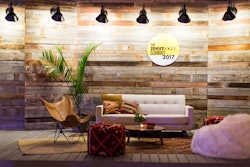In an effort to bring the spirit of the winter holidays to hospitalized children, Honda used augmented reality to create what it called the “Ultimate Get Well Card.” As part of the Happy Honda Days annual sales initiative during the month of December, the car brand used the technology to transform rooms at the Children’s Hospital of Orange County into a winter wonderland.
Honda was inspired to experiment with augmented reality after using virtual reality for a similar idea last year. “We liked the magic that comes with transforming a normal card into something incredibly real that only AR can create,” said Susie Rossick, assistant vice president of Honda Automotive Marketing. “Seeing a typical store-bought card on a table—but then seeing it come to life with your name on it, becoming a doorway to a winter wonderland that is mapped to fit the room, finally becoming a tree full of cards with messages from social media fans, hospital staff, and people all over the world—felt like the best expression of the experience.”
Children at the hospital were given an iPad in a custom-designed holder. As the kids interacted with the card, the custom-designed AR technology caused images with paper birds, snowmen, icicles, and other winter motifs to float forward and expand to fill the room. The card ended with messages from well-wishers around the country that Honda had gathered through its social-media channels, as well as personalized videos from hospital staff.
Honda and ad agency RPA developed the concept, and worked with Los Angeles-based visual-effects company Psyop to create the AR experience for the children. Augmented-reality firm Blippar created the consumer-facing experience—an online film that was posted on Honda’s social channels, as well as a video that allowed online viewers to see exactly what the children saw. For each Facebook “like” or “love” of the film, Honda donated $1—up to a total of $100,000—to both the Children’s Hospital of Orange County and the Pediatric Brain Tumor Foundation.
Rossick noted that Honda had not used this type of augmented reality in the past. “As we learned with this project, the developments in AR technology are changing and getting better every day,” she noted. “We look forward to seeing what future innovations arise in the world of AR.”
Watch a video of the experience below.


















